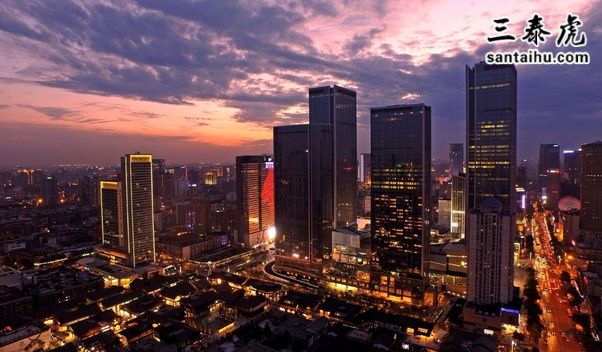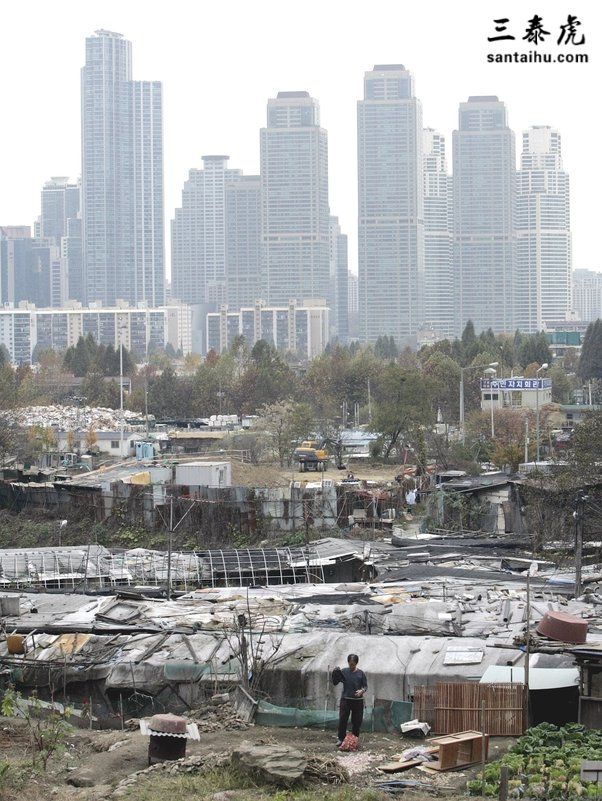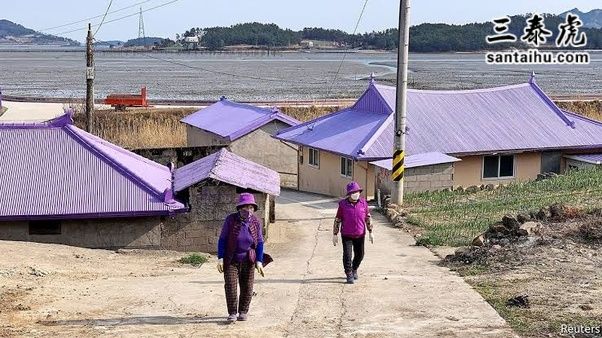Why can't China be more developed like South Korea?
为什么中国不能像韩国那样发达?
以下是Quora网友的评论:
Mr.wonder
Go to China and you do not have to go to big cities.
What you will see and experience will make you realize how childish it is to ask these kind of questions.
你自己去中国看看呗,不用特意去大城市。
你所看到和感受到的一切会让你意识到,这种问题有多幼稚。

Kanthaswamy Balasubramaniam
China was develo along the lines of South Korea from 2000–2008
从2000年到2008年,中国沿着韩国的道路发展
Rapid Urbanization of Select Cities - Shenzhen, Wuhan, Beiing & Shanghai
Heavy expenditure on Infrastructure with nearly 12% Revenue spent on Infrastructure
Rural : Urban GDP Per Capita fell from 66:100 in 1983 to 31:100 by 2008
Approved Rural Migration to Urban Cities exceeded 7 Million per year on an average from 2000–2008
GINI rose from 0.35 to 0.55
深圳、武汉、北京、上海等城市开始了快速城市化的脚步
基础设施支出巨大,近12%的收入用于基础设施建设
农村和城市的人均GDP比值从1983年的66:100下降到2008年的31:100
从2000年到2008年,每年向城市移居的农村人口超过700万人
基尼系数从0.35上升到0.55
The problem is South Korea is not developed in the right way
It has a HUGE PARITY between Urban and Rural sections
It has a HUGE INCOME EQUALITY
但韩国的发展之路存在着问题
韩国的城市和农村地区之间有着巨大的不平等
韩国存在着巨大的收入不平等
This is South Korea
Very similar to some big cities like Shanghai or Beiing in the 2000–2010 period
这是韩国
和2000-2010年期间的上海或北京等大城市非常相似

Rural Development is very low compared to Urban Development
和城市发展相比,农村发展非常落后

That is why China conceived the COMMON PROSPERITY DEAL in 2011 and firmly implemented it from 2018 onwards
这就是为什么中国会在2011年提出共同繁荣的口号,并从2018年起开始坚决实施的原因
Decongestion of Major Four Cities
Development of 16 New Tier 1 Cities
Development of Business Bays.
Development of Towns and Villages
Targeting the Rural: Urban GDP Per Capita from 33:100 in 2015 to 45:100 by 2027
Building at least 30% Modern Roadways in Rural China by 2025 (By Length) versus 4.2% in 2010
为四大城市疏解拥堵
开展16个新一线城市的建设
发展商业湾
发展城镇和村庄
目标:城乡人均GDP到2027年提高到45:100
到2025年,在中国农村地区建设至少30%的现代公路(按长度计算),2010年的数值仅为4.2%。
This is more the US style of development than Korea or Japan
这更接近美国的发展方式,而非韩国或日本。
Micky Moist
Korean home ownership rate 61%
Korean old age poverty rate 40%
Korean birth rate 0.7 %
They have their land occupied by foreign forces
韩国的住房自有率为61%
韩国的老年贫困率为40%
韩国的出生率为0.7%
韩国的土地被外国军队占领了
American occupational forces continue to commit crimes there
Korean have cult like tendencies
Korea almost went bankrupt in 1998 and never recover , the reason they were dependent on american money when the foreign investors took their money out the economy almost collapsed
And their country is literally run by the American politically and some rich families economically this is not something a sane sovereign country want
美国驻军在韩国犯下种种罪行
韩国人喜欢邪教
韩国在1998年几乎破产,再也没能完全恢复,原因是他们依赖美国的资金,当外国投资者把资金撤出韩国时,韩国经济就几近崩溃
实际上,韩国在政治上被美国控制,在经济上被一些财阀家族控制,这决不是一个理智的主权国家所希望得到的。
TAPASWINI
China can be as developed as South korea although the sheer size and population, along with its complex political system, make comparisons challenging which need to reformed.
虽然庞大的面积和人口以及复杂的政治制度带来了挑战,需要进行改革,但中国可以和韩国一样发达。
Fei Wu
It is. Just came back from a visit.
I would recommend visiting there in person, or check out some vloggers from youtube.
中国已经很发达了。我刚去过中国。
我建议你亲自去中国看看,或者去油管上看看那些博主发的视频。
R.M.L.
What specifically are you referring to?
South Korea didn't have the USA sanction it for over two decades. China wasn't even able to import agricultural products during the years that the USA sanctioned it because countries feared that the USA would penalize them for violating the sanctions.
你具体指的是什么?
20多年来,韩国没有受到过美国的制裁。而中国在受到美国制裁的那些年里,连农产品都无法进口,因为各国担心会因为违反美国的制裁令而遭到美国的报复。
China is also a humongous country.
South Korea is a much smaller country that enjoys trade surpluses with China.
And even though South Korea has trade surpluses with China, it's hel the USA to contain China's rise. They don't want China to develop any further.
In any case, many parts of China sure appear far MORE developed than South Korea.
中国是一个幅员辽阔的国家。
韩国比中国小多了,对中国享有贸易顺差。
即便韩国对中国享有贸易顺差,韩国也还是帮助美国遏制中国的崛起。他们不希望中国发展壮大。
但不管怎么说,中国的许多地方看起来都确实比韩国发达许多。
Dr. Balaji Viswanathan
How did South Korea develop so fast both in economy and culture?
韩国是如何在经济和文化上发展得如此之快的?
Stage 1: Achieving 100% literacy
By 1940s, South Korea already had a fairly literate population by Asian standards of that time. This was partly because of Japanese occupation
While de ocracy and human ri hts suffered, Japanese have been quite instrumental in building Korea's infrastructure and also strongly integrated the economy with Japan.
第一阶段:实现100%扫盲
20世纪40年代,按照当时的亚洲标准,韩国受教育人口的比例很高。部分原因是日本的占领。
虽然韩国的皿煮主义和人*受到损害,但日本人在韩国的基础设施建设中还是发挥了重要作用,并在经济上与日本进行了强有力的融合。
After the war, the South Korean government took a significant step in expanding the reach of literacy to all. This eliminated illiteracy by the 1960s giving it a significant advantage compared to most Asian countries. Human capital is the foundation of a developed nation.
战后,韩国政府迈出了重要的一步,将教育普及范围扩大到所有人。韩国在20世纪60年代消除了文盲,与大多数亚洲国家相比,这是一个显著的优势。人力资本是一个发达国家的基础。
Stage 2: Land reforms
One of the most understated economic factor is land reforms. It is extraordinarily important for growth and peace. In India, there is a major revolution in the hinterland due to the lack of land reforms there. Land reforms makes or breaks a nation. In Korea, key land reforms happened in late 1940s that built a significant middle class. It was partly done by the US who forced the Japanese land owners out and redistributed the property.
第二阶段:土地改革
最被低估的经济因素之一是土地改革。土地改革对增长与和平极为重要。在印度,由于缺乏土地改革,内陆地区爆发了一场重大的革命。土地改革可以成就一个国家,也可以毁灭一个国家。韩国在20世纪40年代末进行了重要的土地改革,一个重要的中产阶级得以产生。这场土地改革的部分起因是美国迫使日本土地所有者离开韩国并对土地进行重新分配。
Stage 3: Market Reforms under Park Chung-hee
Literacy and land reforms are necessary, but not sufficient conditions for growth. South Korea was still poor in 1960s, until the stage 3 in growth came. In fact, it was just rubbing shoulders with North Korea until then.
Park Chung-hee forcefully took the country towards a freer market and opened up the economy. He also deepened the relationship with US and Japan. That's where you start seeing the curve moving up.
Companies like Hyundai, LG and Samsung got a sizable share of government largesse that might have a long term damage on growth.
第三阶段:朴正熙主导的市场改革
扫盲和土地改革是必要的手段,但并不是经济增长的充分条件。韩国在20世纪60年代仍然很贫穷,直到第三阶段才实现了经济增长。在此之前,韩国和朝鲜一直差别不大。
朴正熙用雷霆手段带领韩国走向更自由的市场,开放了经济。他还深化了韩国与美国和日本的关系。韩国自此开始大幅增长。
现代、LG和三星等企业获得了政府大量的援助,这可能会对经济增长造成长期损害。
Stage 4: Demographic Shift
This is again an understated effect. Countries that have gone through a first phase of growth will have rapidly falling population growth rate leading to the a virtuous circle for a while. People focus more on career than families - leading to fewer children. In the initial few decades this is a great advantage - as people will rapidly move up in career ladder and would not have kids to slow them down. They will get richer and mobile.
Things all go well until it comes time for retirement. Then, all the things about putting career over family bites. In short, demographic shift is a one-time growth lottery that Japan and Korea used well. However, the lottery's "high" wears off at some point and the hangovers are very severe. Japan is going through this painful process and South Korea has just started.
第四阶段:人口结构转变
这也是一个被低估了的因素。经历第一阶段增长的国家,人口增长率会迅速下降,从而在一段时间内形成良性循环。相较于家庭,人们更关注事业,这导致了新生儿的减少。在开始几十年里,这是一个巨大的优势—因为人们得以在职业道路上迅速提升,没有孩子拖累。他们变得更富裕,更方便。
一切都很顺利,直到退休。然后,把事业置于家庭之上的做法开始反噬了。简而言之,人口结构的变化是一次性的增长彩票,日本和韩国很好地利用了这一点。但彩票带来的“兴奋感”在某个时刻消退,带来非常严重的后果。日本正在经历这一痛苦的过程,而韩国才刚刚开始。
Other factors:
Constant threat from North Korea. This keeps South Koreans on their toes giving them no opportunity to go lax.
Lots of help from the US. At one point 60% of all investment came from the US. Of course, it doesn't hurt to be a US ally. Foreign Economic Relations- The difference from Middle East allies of US is that South Korea did make its citizens literate, give them land and open up the economy, without which US Aid would have been ineffective.
其他因素:
来自朝鲜的持续威胁。这让韩国人没有机会放松,一直高度紧张。
美国提供了很多帮助。曾经有一段时间,韩国有60%的投资来自美国。当然,成为美国的盟友也无妨。对外经济关系—韩国与美国中东盟友的不同之处在于,韩国让公民识字,给他们土地并开放经济,如果没有这些措施,美国的援助也于事无补。
Summary
South Korea's growth is a combination of quick achievement of 100% literacy that started in Japanese occupation, significant land reforms that created the middle class, significant market reforms that helped the middle class trade with the world and a demographic one-time lottery. Most co unist nations miss the stage 3 thus they are educated with land reforms with stunted growth. Many crony capitalist nations miss stages 1 & 2, thus they have a "free" market but without a populace that is educated and with land to make use of the market. South Korea ticked off all its boxes.
总结
韩国的增长是几个因素共同作用:始于日本占领时期的100%识字率,创造了中产阶级的重大土地改革,帮助中产阶级和世界贸易的重大市场改革以及人口大乐透。大多数国家错过了第三阶段,虽然他们接受了土地改革和教育,但增长缓慢。许多裙带资 本主义国家错过了第一和第二阶段,因此他们虽然有“自由”市场,但缺乏受过教育的民众和土地来发展市场。韩国满足了一切要求。
Hong Hwa Lee
Why is Korea more developed than its neighbors, China and Japan?
为什么韩国比邻国中国和日本更发达?
Although Korea has managed to surpass Japan in some specific areas, not many people will argue that it is more developed than Japan. Also, although Korea is much richer than China per capita, China is ahead of Korea in crucial so-called fourth industrial revolution technologies. Be that as it may, I think it is safe to say Japan is the most developed country among the three. Then, it’s Korea…
虽然韩国在某些领域超越了日本,但认为韩国比日本更发达的人并不多。此外,虽然韩国的人均财富远高于中国,但中国在第四次产业革命技术上领先于韩国。但我觉得可以肯定,日本是三个国家中最发达的国家,然后是韩国……
There can be many explanations as to why this is, but I think there is a very simple explanation. Even if we discount the Meiji Restoration which started in 1868 (that puts the begng of the Japanese modernization drive as early as some European powers), Japan started its economic drive in the 50s—1950 when the Korean War started was a crucial year as some Japanese called it ‘gift it from heaven’—Korea started its export-oriented drive in the early 60s and China opened its doors in 1978. The circumstances these countries faced when they started their economic drive are different, but there is no question that these countries experienced extremely high rates of growth for about three decades after they began their drive, which I think is required for a develo country to become rich.
至于为什么会这样,有很多解释,但我认为有一个非常简单的解释。就算我们不考虑1868年开始的明治维新(因为明治维新,日本的现代化进程比有些欧洲大国还早),日本经济在50年代开始发展,朝鲜战争爆发于1950年,是日本人称之为“天赐之礼”的关键一年—韩国在60年代初开始发展以出口为导向的经济,中国在1978年改革开放。这些国家在开始发展经济时所面临的环境是不同的,但毫无疑问,这些国家在随后的大约30年里经历了极高的经济增长率,我认为这是一个发展中国家想要致富所必需的。
Currently, the Japanese economy already has begun to shrink, the Korean economy is going through rough patches and the Chinese economy has begun to slow down, but the pecking order is expected to remain for a while…
如今日本经济已经开始萎缩,韩国经济进入艰难时期,中国经济也开始放缓,但预计这个排名将持续一段时间……
此文由 三泰虎 编辑,未经允许不得转载!:首页 > 印度看中国 » 为什么中国没有像韩国那样发达
 印网友的评论:来自中国和韩国的竞争加剧,印度对亚洲的柴油出口暴跌63%
印网友的评论:来自中国和韩国的竞争加剧,印度对亚洲的柴油出口暴跌63% 印度游客:中国发达城市夜生活,令人难以置信,这座城市看起来太梦幻了
印度游客:中国发达城市夜生活,令人难以置信,这座城市看起来太梦幻了 印度人参观中国云南的少数民族村庄,这里与印度东北很像,不过发达100倍,干净100倍
印度人参观中国云南的少数民族村庄,这里与印度东北很像,不过发达100倍,干净100倍 中国能在2030年前成为发达国家吗
中国能在2030年前成为发达国家吗 作为一个即将成为发达国家的国家,中国为什么不承担起责任,接纳更多的难民
作为一个即将成为发达国家的国家,中国为什么不承担起责任,接纳更多的难民 中国能在2030年前成为发达国家吗
中国能在2030年前成为发达国家吗 是不是只要美国在亚洲有日本、印度、韩国等强大的盟友,就能制约中国的行动
是不是只要美国在亚洲有日本、印度、韩国等强大的盟友,就能制约中国的行动 以人均GDP论,中国才刚刚赶上巴西等国家,中国是如何成功打造出比这些国家发达得多的基础设施的
以人均GDP论,中国才刚刚赶上巴西等国家,中国是如何成功打造出比这些国家发达得多的基础设施的